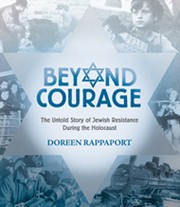Denmark is known and respected for having resisted its German occupiers, and for saving most of its Jewish population during the famous boatlift to Sweden before the German occupiers could round up the Jews and deport them to camps. Few knew, however, how the Danish Resistance started. In the first two years of German occupation, the Danes had tried to show resistance by singing patriotic Danish songs in public places and wearing a patriotic “King’s pin.” But that did not satisfy a young man named Knud Pedersen, who, after a two-year period of his country’s nonresistance to the German occupiers, became disgusted and started a campaign of his own. His brothers and schoolmates, perhaps ten in all, eventually joined him. They called themselves “The Churchill Club” because, at the same time that they embarked on their lonely campaign of resistance, England’s Winston Churchill was also on his, as the sole Allied champion fighting against Hitler and Germany. The Churchill Club’s acts of sabotage grew more and more sophisticated, daring, and dangerous. Between December 1941 and their arrest in May 1942, the boys had struck more than two dozen times, racing through the streets on bicycles after performing more and more dangerously complex “hits.” Pedersen was able to describe to the author, in intriguing detail, the various actions that the group took, including the ones used to disguise their actions from the Germans. The deeds of these ten pre-high-school boys “awakened the complacent nation,” writes author Philip Hoose, and aroused others to emulate them. (Years later, Churchill, hearing about them, honored the now full-grown men.) The author has also added much of his own research, descriptions, and reflections to this intriguing and exciting story. Photos and a bibliography are included. Highly recommended for ages 12 – 18.

Children’s
The Boys Who Challenged Hitler: Knud Pedersen and the Churchill Club
- Review
By
– February 2, 2016
Marcia W. Posner, Ph.D., of the Holocaust Memorial and Tolerance Center of Nassau County, is the library and program director. An author and playwright herself, she loves reviewing for JBW and reading all the other reviews and articles in this marvelous periodical.
Discussion Questions

Jewish literature inspires, enriches, and educates the community.
Help support the Jewish Book Council.


